We will find something that is very disappointing in the remainder of this chapter.
The question arises: When man came out of the ark after the Flood and all the sinners were dead, does that mean that there was no more sin on the earth?
Well, let’s look and see.
Genesis 9:18-29 KJV
[18] And the sons of Noah, that went forth of the ark, were Shem, and Ham, and Japheth: and Ham is the father of Canaan.
[19] These are the three sons of Noah: and of them was the whole earth overspread.
[20] And Noah began to be an husbandman, and he planted a vineyard:
[21] And he drank of the wine, and was drunken; and he was uncovered within his tent.
[22] And Ham, the father of Canaan, saw the nakedness of his father, and told his two brethren without.
[23] And Shem and Japheth took a garment, and laid it upon both their shoulders, and went backward, and covered the nakedness of their father; and their faces were backward, and they saw not their father’s nakedness.
[24] And Noah awoke from his wine, and knew what his younger son had done unto him.
[25] And he said, Cursed be Canaan; a servant of servants shall he be unto his brethren.
[26] And he said, Blessed be the LORD God of Shem; and Canaan shall be his servant.
[27] God shall enlarge Japheth, and he shall dwell in the tents of Shem; and Canaan shall be his servant.
[28] And Noah lived after the flood three hundred and fifty years.
[29] And all the days of Noah were nine hundred and fifty years: and he died.
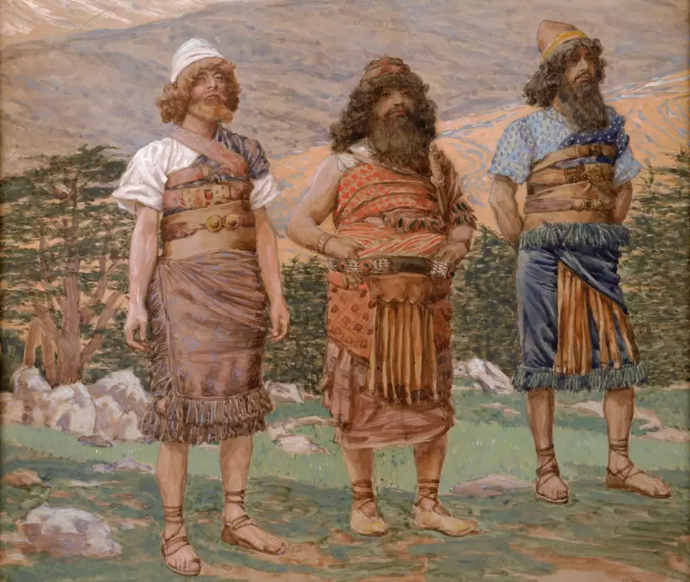
Genesis 9:18
And the sons of Noah, that went forth of the ark, were Shem, and Ham, and Japheth: and Ham is the father of Canaan.
Why is Ham’s son Canaan mentioned here?
For two reasons. One reason we’ll see in a moment. Another reason is that when Moses wrote this record, the people of Israel were traveling to the land of Canaan, and it was encouraging for them to have this information regarding God’s judgment upon the people of Canaan.
When humanity filled the earth with sin and violence (Genesis 6:5), God destroyed it with a flood (Genesis 7:4). Only Noah and his family were spared (Genesis 7:1). Their salvation came in the form of a wooden container—an ark—which was built according to God’s design (Genesis 6:11–22).
In the prior passage, God delivered a promise to those who came off of the ark. God would never again destroy the world using a flood (Genesis 9:11). This promise was made not only to the humans on board, but also to the animals (Genesis 9:9–10).
The sign given by God to commemorate this covenant is the rainbow (Genesis 9:12–13).
Mankind’s primary responsibility, now, is to repopulate the earth (Genesis 9:7). In verses 18 and 19, Scripture records the new genealogies which will produce the rest of the human race.
Noah’s sons, Shem, Ham, and Japheth, are reintroduced to set up the story that will follow. Ham’s son Canaan is also introduced to us for the first time. He will figure prominently in the story and its aftermath as well.
Genesis 9:19
These are the three sons of Noah: and of them was the whole earth overspread.
All people who have ever lived since the Flood came from these three sons of Noah. The, one blood, of Acts 17:26 is that of Adam through Noah. All physical characteristics of the whole race were present in the genetics of Noah, his sons, and their wives.
God’s covenant with Noah also included the rest of humanity (Genesis 9:9) as well as the animal kingdom (Genesis 9:10). That promise is to never again destroy the entire earth with a flood.
That vow is important; the number one priority for every living thing which came off the ark (Genesis 8:17) is to reproduce and re-populate the land.
God’s sign of the rainbow serves as a reminder of God’s oath to not wipe out life as He has just done (Genesis 9:14–15).
The previous verse reintroduced Noah’s sons, Shem, Ham, and Japheth. Now we’re reminded that all of the people of the earth to come will be born of these three men.
Every human being ever to live, from that day forward, will hold one of these three men as their original ancestor, along with Noah, along with Adam.
This is an important reminder that, ultimately, all human beings are from the same ancestors (Genesis 3:20; Galatians 3:28), giving explicit biblical support to the idea that all races are equally human.
The verses to follow will tell a troubling story and reveal God’s plan for the generations to come.
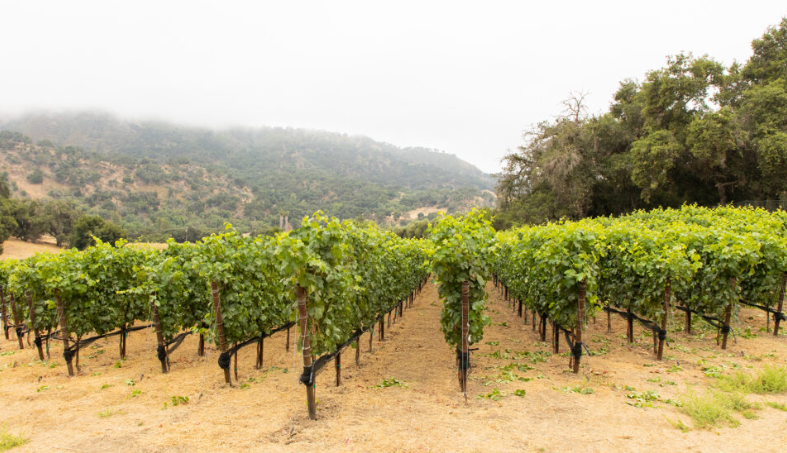
Genesis 9:20
And Noah began to be an husbandman, and he planted a vineyard:
The word began brings an ominous note to the early stories in Genesis. Husbandman – literally means, man of the soil, perhaps indicating, master of the earth, or lord of the earth.
Noah, the ark builder and animal tender (Genesis 6:11–22), now becomes Noah the farmer. Presumably, this is what Noah had done prior to his work on the ark.
Now that the flood is over, and mankind is told to re-populate the earth, he becomes a man of the soil.
This description comes from a Hebrew phrase which looks something like “a man who breaks the ground,” and literally means “to begin farming.”
In this case, Noah planted a vineyard in order to make wine. It’s certainly possible that wine was made before the flood, but this is the first recorded reference to wine in Scripture.
It exemplifies humanity’s complicated relationship with alcohol to come in all future generations. On the one hand, wine is described as a gift from God that brings gladness to the human heart (Judges 9:13; Psalm 104:15).
On the other hand, wine and other forms of alcohol will often contribute to sinful thoughts, actions, and words throughout human history (Proverbs 31:4; Ephesians 5:18).
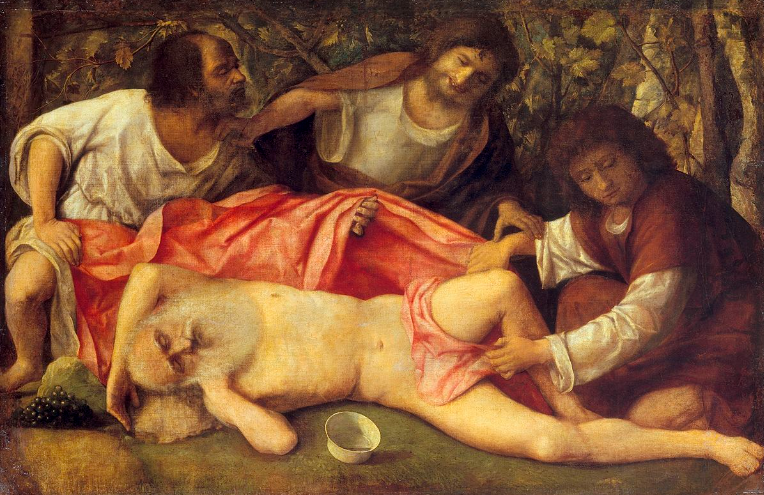
Genesis 9:21
And he drank of the wine, and was drunken; and he was uncovered within his tent.
Here is the record of Noah’s sin. Noah had been so faithful to God that it is unlikely that he did this deliberately. His drunken condition may have been a totally unexpected result of the changed environment after the Flood.
The hard fact of the matter is that Noah got drunk, and this is sin. There is no satisfactory excuse, although many expositors have attempted to find excuses for him. One excuse is that he was ignorant of the effect of wine since no one had been drunk before.
You will notice that before the Flood, drunkenness is not mentioned as one of the sins. Well, all I can say is that this is a new beginning in a new world, but it is old sin that is still there.
This incident reveals this, and it was given to answer a big question. as we shall see.
It is unclear from this verse whether Noah’s actions of getting drunk and laying uncovered in his own tent are meant to be understood as sinful in themselves. Scholars hold various opinions on the question.
On one hand, drunkenness is specifically condemned in the New Testament and warned against in the Old Testament. On the other hand, Scripture is not explicitly clear on what particular rules God had related to Noah regarding the use of alcohol.
The other possible interpretation here is whether Noah participated in some sexual sin, or lewdness, or whether his drunkenness simply made him careless about covering himself from potentially being seen by others.
Wine is often described as one of God’s good gifts to Israel. Part of the blessing of wine, in fact, is specifically tied to its effect on a person’s mood (Psalm 104:15).
God would later command the offering of wine in sacrifices (Numbers 15:5–10) and even encourage the purchase of wine and strong drink (Deuteronomy 14:26) as part of certain celebrations.
However, God’s instructions in the Bible also recognize the distraction and danger of alcohol. Later, under the law given by Moses, priests will be forbidden from drinking before their work in the sanctuary (Leviticus 10:9).
Those most committed to God, the Nazirites, would vow to abstain from wine and strong drink completely (Numbers 6:3–4). And Scripture will make clear that drinking too much wine is foolish (Isaiah 5:22; Proverbs 21:17).
The clearest command against actual drunkenness comes from Paul: “Do not get drunk with wine” (Ephesians 5:18).
Noah, in his drunkenness, lays naked in his tent. Following their initial sin, Adam and Eve became aware of their nakedness and covered themselves. God’s actions made it clear that it was appropriate for them to cover their nakedness.
Noah, drunk, reverses that action here, uncovering himself.
To whatever extent Noah misbehaved while drunk, it certainly doesn’t sound like the righteous and blameless Noah we have come to know in previous chapters (Genesis 6:9).
This story confirms that we are not meant to see Noah as sinless, or morally perfect, in and of himself.
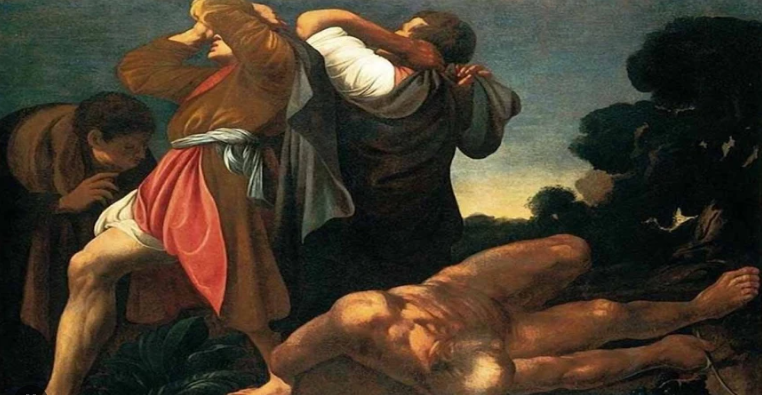
Genesis 9:22
And Ham, the father of Canaan, saw the nakedness of his father, and told his two brethren without.
Ham . . . saw the nakedness of his father: While many explanations have been suggested for this phrase, it is best to take it to mean merely what it says.
There is no indication of any gross violation. The phrase is not the same as in Leviticus 20:17, where it is parallel to another term used exclusively for sexual violations.
The phrase indicates that this violation of privacy was merely the beginning of eventual sexual degradation.
After the flood, Noah plants a vineyard and enjoys the wine it produces.
While the Bible speaks positively of wine (Numbers 15:5–10; Deuteronomy 14:26), including its ability to influence a person’s mood (Psalm 104:15), it also strongly warns about the danger which alcohol represents.
This story shows one such potential pitfall of consuming alcohol: In the previous verse, Noah is described as getting drunk and laying naked in his own tent.
It is unclear whether this implies a sinful action on Noah’s part or simply a carelessness about his own modesty because of his drunken state.
In literal terms, all that this verse tells us is that Ham saw Noah’s drunken nakedness, and told his brothers about it.
Noah’s reaction later in the passage, however, certainly suggests an offense more involved than simply seeing Noah naked and going to tell others, rather than helping him (Genesis 9:24).
Some scholars suggest that Ham took advantage of his father in some way, perhaps even sexually. As disturbing as that might seem, and while the text itself does not describe any such action in the following verses, Noah will condemn Ham for what he “had done to him.”
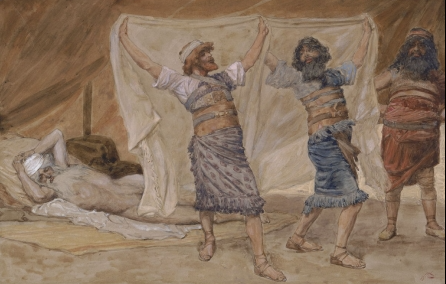
Genesis 9:23
And Shem and Japheth took a garment, and laid it upon both their shoulders, and went backward, and covered the nakedness of their father; and their faces were backward, and they saw not their father’s nakedness.
Perhaps Shem and Japheth did not want to see their father’s dignity and authority reduced to such weakness. They did not share Ham’s attitude.
The previous verses describe a scenario involving Noah and his sons without providing more than the barest of details. Even so, this event will have grave implications. Noah got drunk on the wine from his new vineyard (Genesis 9:21).
In his drunkenness, he lay naked in his own tent. Noah’s son Ham walked in, saw him naked, and went out and told his brothers.
The response of Shem and Japheth reveals how seriously they and their culture took the issue of seeing another’s nakedness and honoring one’s father.
With great care and creativity, they found a way to cover their father without ever looking at him. In this way, they honored Noah greatly.
Did Ham intend to dishonor Noah? The following verse will imply that he did, resulting in Noah’s curse on Ham’s descendants (Genesis 9:25). Some suggest that Ham’s sin was failing to help his father by covering him—instead, Ham went to tell others what he had seen.
Others believe that “what He did to [Noah]” (Genesis 9:24) was something more disturbing and personal. The extremely vague nature of the passage, in its own way, supports this idea since ancient literature was famously shy about describing certain shameful acts in any detail.
In any case, whatever Ham has done is so offensive, it brings severe consequences.
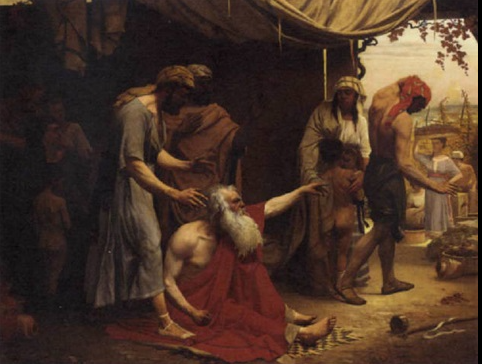
Genesis 9:24
And Noah awoke from his wine, and knew what his younger son had done unto him.
This incident could scarcely have happened till twenty years after the flood; for Canaan, whose conduct was more offensive than that even of his father, was not born till after that event.
It is probable that there is a long interval included between these verses and that this prophecy, like that of Jacob on his sons, was not uttered till near the close of Noah‘s life when the prophetic spirit came upon him; this presumption is strengthened by the mention of his death immediately after.
The previous verses describe Noah getting drunk and passing out naked inside his tent (Genesis 9:21). His son Ham walked in, saw his father naked, left the tent, and told his brothers what he’d seen (Genesis 9:22). Shem and Japheth took measures to cover their father without looking at him.
Now, Noah wakes up. He either remembers what happened or someone tells him. The limited details given in this passage make it unclear, exactly, if Ham intended any harm or dishonor to his father. Some scholars suggest that in this era, to see another’s nakedness is to shame him and to become superior to him in a sense. It is possible that Ham thought telling his brothers what he had seen would elevate his status in some way. Instead, as the following verse reveals, the opposite will happen.
This verse, told from a narrator’s perspective, refers to Ham’s actions as “what [Ham] had done to Noah.” Beyond Noah’s opinion, Scripture clearly indicates that Ham has done something immoral or inappropriate to his father. Whether this is something as simple as seeing Noah naked without helping him, or something more sinister, the passage does not explicitly say. However, the Hebrew verb here is an active one: implying a purposeful action, not just a passive one. Ham does something more than simply see Noah, but we cannot say for sure what that was.
It’s interesting that the text calls Ham Noah’s youngest son. It’s easy to assume that Ham was the middle son, since the names are always listed as “Shem, Ham, and Japheth” (Genesis 9:18; Genesis 6:10). The Hebrew term used here is haqā’tān, which can mean “youngest,” but can also mean “smallest” or “least” or even “unimportant.” Scholars suggest this might mean Ham was the smallest son, or simply that the usual ordering of the names is not by age.
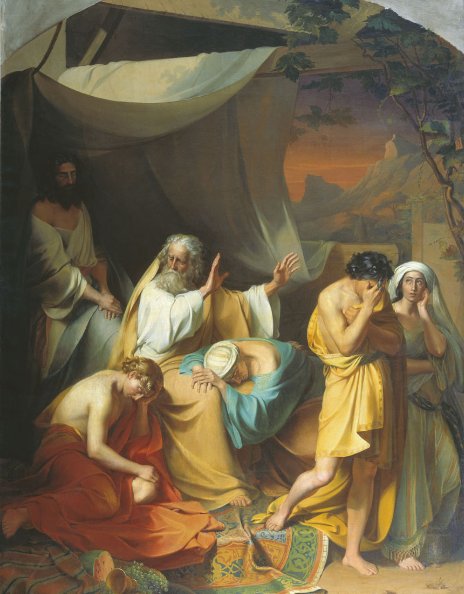
Genesis 9:25
And he said, Cursed be Canaan; a servant of servants shall he be unto his brethren.
Now notice what God says through Noah, which became part of the Noahic covenant. This doom has been fulfilled in the destruction of the Canaanites – in the degradation of Egypt and the slavery of the Africans, the descendants of Ham.
I would have you note that God said, “Cursed be Canaan”—He does not put a curse on Ham. A question that keeps arising is this: Is the curse of Ham upon the dark races?
It certainly is not. To think otherwise is absolutely absurd. The Scripture does not teach it. The coloration of the skin, the pigment that is in the epidermis of the human family, is there because of sunlight from the outside not because of sin from within. There is no curse placed upon Ham; the curse was upon Canaan his son.
We do not know in what way Canaan was involved in this incident. We are given only the bare record here, but we recognize that Canaan is mentioned for a very definite purpose. Let me repeat that it hasn’t anything to do with color—it is not a curse of color put on a part of the human race.
That teaching has been one of the sad things said about the black man. It is not fair to the black man and it is not fair to God—because He didn’t say it. After all, the first two great civilizations were Hamitic—both the Babylonian and Egyptian civilizations were Hamitic.
Another question arises: Why did God give us a record of the sin of Noah?
Well, if man had written the Book of Genesis, he would have done one of two things. He either would have covered up the sin of Noah by not mentioning it at all to make Noah a hero; or else he would have made Noah’s sin a great deal more sordid than it was. But God recorded it for His own purposes.
First of all, as I have indicated, it was to encourage the children of Israel in entering the land of Canaan during the time of Moses and Joshua. It let them know that God had pronounced a curse upon Canaan. He had pronounced His judgment upon the race.
All you have to do is read the rest of the Old Testament and secular history to discover the fulfillment of this judgment. The Canaanites have pretty much disappeared. God had a further reason for recording the incident of Noah’s sin.
In Romans 15:4 we read these words: “For whatsoever things were written aforetime were written for our learning, that we through patience and comfort of the scriptures might have hope.”
It was recorded to let you and I know something of the weakness of the flesh. The Lord Jesus said that the spirit is willing but the flesh is weak.
And in Galatians 2:16 it is made very clear that no flesh would be justified by keeping the law: “. . . for by the works of the law shall no flesh be justified.”
So God has given us here the story of a man who fell. revealing the weakness of the flesh. There is no use trying to make excuses for Noah. The bare fact is that Noah got drunk. Now, maybe you as a Christian do not get drunk.
But, may I say, you and I may be living in the flesh to the extent we’re just as displeasing to God as Noah was. We have, I think, a wrong conception of life in this universe that we are in. For instance, our nation has spent billions of dollars to put men on the moon, and it looks like it’s not a good place to live anyway.
But we spend relatively little on how to live on this earth. But God is concerned about training you and I how to live on this earth. Let us not make some of the mistakes that are made in the consideration of this incident.
We need to make it very clear that Noah did not lose his salvation. I trust that you understand that. It was an awful thing that he did—there is no excuse for it.
It was his weakness of the flesh, but he was still a saved man.
What was Ham’s wrongdoing, exactly?
At the very least, his choice to tell his brothers about seeing Noah’s nakedness made him guilty of furthering Noah’s dishonor. Perhaps he laughed at Noah, telling his brothers in an effort to mock his father.
It’s possible Ham was attempting to use what he had seen to elevate his own importance in the family. It’s also possible, though not stated, that Ham did something to additionally violate Noah while he was helpless.
Either way, the prior verse makes it clear that Ham has sinned against Noah (Genesis 9:24). And, as this passage shows, that results in dire consequences.
If Ham’s intent was to improve his status by humiliating his father, it backfired. Instead, Noah now curses Ham’s descendants. They will become servants to the descendants of Ham’s brothers.
The curse is actually levied against Canaan, Ham’s son. This is the first time in recorded Scripture that a human being curses other people. Apparently, Noah’s curse was backed by God’s authority.
Why curse Canaan, the son, instead of Ham himself?
We’re not given the reason. God had blessed Noah and his sons earlier in the chapter, so perhaps it wasn’t an option to curse one God had blessed.
Or perhaps it was a case of the punishment fitting the crime as Canaan would become dishonorable to Ham as Ham was dishonorable to Noah.
In any case, the curse is that Canaan, and his descendants, will become the lowest of slaves or a “servant of servants” to Ham’s brothers and their descendants.
Much later, these descendants of Canaan became known as the Canaanites, the people who occupied the Promised Land Israel conquered after the exodus from Egypt. The following two verses will expand on the curse.
This verse has, unfortunately, often been used in an attempt to justify various forms of racism, including slavery.
Under that use, this verse would suggest that the curse was really on Ham, not on Canaan, and implies there is a certain “race” of men divinely appointed to slavery and subjugation.
This is not supported by the Hebrew, however, which does not use the terminology for slavery, even in the limited sense in which it was practiced by Israel.
In fact, for most of the history recorded in the Old Testament, it is the descendants of Ham who have the advantage over the descendants of Shem and Japheth.
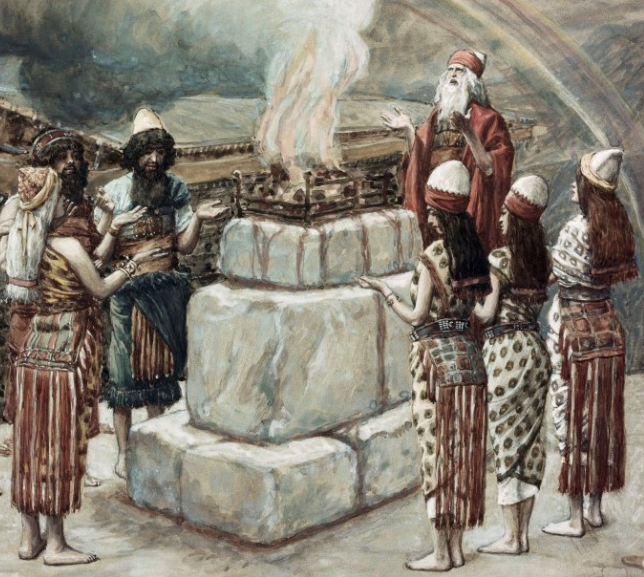
Genesis 9:26
And he said, Blessed be the LORD God of Shem; and Canaan shall be his servant.
Rather, Blessed of Jehovah, my God, be Shem, – an intimation that the descendants of Shem should be peculiarly honored in the service of the true God, His Church being for ages established among them, the Jews, and of them, concerning the flesh, Christ came.
They got possession of Canaan, the people of that land being made their, servants, either by conquest, or, like the Gibeonites, by submission, found in Joshua 9:25.
As I have mentioned before, when Moses was given this revelation from God, he was leading the people of Israel to the land of Canaan. The Israelites were descendants of Shem.
In the previous verse, Noah cursed Canaan, Ham’s son, as a result of Ham’s extraordinary dishonor of his father (Genesis 9:24-25).
The curse applied to their descendants, as well. Now, apparently to emphasize the curse, Noah blesses Ham’s brothers. Here, actually, Noah blesses the Lord, “the God of Shem.”
Since Shem’s line is the one that leads to Abraham and the Israelites, this may very well be the first hint that God will make Shem’s people His people.
This not only makes Shem the ancestor of the nation of Israel, it means Shem’s ancestral line will produce the promised Messiah, Jesus Christ (Luke 3:36).
The curse on Canaan is repeated once more. Much later in history, the people occupying the promised land, the people Israel would conquer, will be known as the Canaanites.
Many times throughout Israel’s history, the Canaanites would be in conflict with and serve the Israelites (descendants of Shem). More pertinent to this curse, they would always eventually find themselves on the “losing side” of their conflicts with Israel.
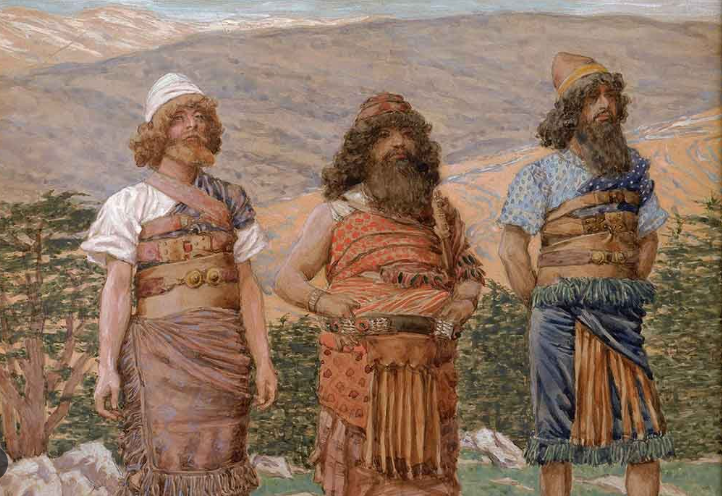
Genesis 9:27
God shall enlarge Japheth, and he shall dwell in the tents of Shem; and Canaan shall be his servant.
God shall enlarge Japheth, pointing to a vast increase in posterity and possessions.
Accordingly his descendants have been the most active and enterprising, spread over the best and largest portion of the world, all Europe and a considerable part of Asia.
he shall dwell in the tents of Shem, a prophecy being fulfilled at the present day, as in India, British Government is established and the Anglo-Saxons being in the ascendancy from Europe to India, from India over the American continent.
What a wonderful prophecy in a few verses found in Isaiah 46:10 and 1 Peter 1:25!
Noah cursed Canaan, Ham’s son, to be a servant to Ham’s brothers. The curse applied to their descendants as well.
The previous verse extended Ham’s curse with a comparative blessing of his brother Shem.
Now Noah blesses Ham’s other brother, Japheth. God will “enlarge” Japheth or extend his territory. In addition, Japheth’s descendants will live in (or among) the tents of Shem.
The family line of Shem will eventually lead to God’s people Israel, through Abraham and Isaac (Genesis 11:10–27; Genesis 21:1–3). This same family line will also produce the Messiah, Jesus (Luke 3:36).
However, it is not clear what it means that Japheth’s people will live in or among the tents of Israel, or when that prophecy was fulfilled. Scholars have suggested many options, but none are conclusive.
In any case, the curse on Canaan’s descendants is repeated a third time, giving it unusual emphasis in Scripture. Canaan’s people will be successful in many ways, and often will hold an advantage over other people and nations.
However, their fate will always come to the same eventual conclusion: failure, due to their opposition of God’s chosen people.
While the Hebrew language used here does not suggest that Canaan’s children will become the literal slaves—the forced servants—of Japheth’s people or Shem’s people, it does indicate a lack of favor.

Genesis 9:28
And Noah lived after the flood three hundred and fifty years.
Noah, who was six hundred years old at the time of the flood, lived to see two worlds three hundred and fifty years later.
The years from the beginning of the flood until the death of Noah were 350. That would have allowed Noah to live to see his grandchildren begin to increase in number.
Noah would have lived to see their children and grandchildren begin to spread out across the earth. This is part of Noah’s blessing in obeying God (Genesis 6:9)—the chance to see those promises fulfilled.
Prior to the flood, God made a remark about mankind, referring to 120 years (Genesis 6:3). Some scholars believe this was a reference to the amount of time left before God planned to send the flood.
Others see this as God intentionally limiting the lifespans of human beings. The context of the remark is humanity’s pervasive evil (Genesis 6:5); after the flood, lifespans begin to drop dramatically.
Patriarchs such as Adam, Seth, and Methuselah live some nine hundred years, as will Noah. Genesis chapter 11, however, will describe a line of descendants whose days rapidly decrease.
Genesis 9:29
And all the days of Noah were nine hundred and fifty years: and he died.
Noah died at the age of nine hundred and fifty years old.
Being an heir of the righteousness which is by faith, he now rests in hope, waiting to see a better world.
Early men such as Adam, Seth, and Methuselah are credited with lifespans of more than nine hundred years. Noah, however, will be the last to live such a long life.
Genesis chapter 11 describes the genealogies of mankind from Noah through to the next major patriarch: Abraham. Over that time period, spanning just eight generations, the length of human lives plummets.
Even the great prophet Moses will live to be just 120 years old, while his brother Aaron will live to be 123.
This figure of 120 years becomes more or less the maximum lifespan for humanity on the post-flood earth.
For this reason, many scholars believe that God’s remark about striving with man (Genesis 6:3) was a reference to God purposefully limiting the length of a human life.
If so, this was in no small part meant to limit man’s ability to inflict evil and violence on the earth (Genesis 6:5).
I hope that you have really enjoyed this post,
Please Leave All Comments in the Comment Box Below ↓

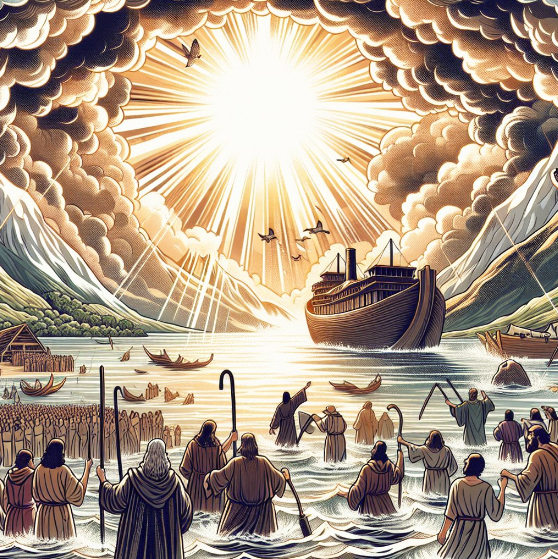











I belong to the school of thought, that will want to take the bible’s account of Ham seeing Noah’s nakedness to mean what it says.
It shows the effect of alcohol on the life of a man. Although some sets argue about the health benefit of alcohol, its downside has always been an issue for man to contend with. I have never thought of a link between Noah’s action and the limited age of one hundred and twenty.
Thank you for these notes.
I will have to do more research work to learn.
Hello Parameter,
Thank you for your continued support, as well as, taking the time to comment on this HBS & DwJ episode.
Your comments are greatly appreciated.
Blessings My Friend!
I recently read the article on “The Sin of Noah and His Sons: A Sinful Beginning” from “God in Our Lives Every Day,” and I was genuinely impressed. The author’s insightful exploration of this topic captivated me from start to finish.
Highly recommended for its thought-provoking perspective and engaging writing style.
Hello Steve,
Thanks a lot for sharing your thoughts and comments about this HBS & DwJ Podcast episode with us.
The responses you have been sharing on this episode, and other episodes on this HBS & DwJ website turned HBS & DwJ Podcast, helps me to make minor tweaks as I go along.
Every comment on this site is well appreciated and I make sure I read them on the HBS & DwJ Podcast episodes.
Blessings My Friend!
Hi once more I’ve been to your website before and like what I see.
At the moment, I am reading the Bible through once more and have come to grips with the story of Noah. Here we can see that we all fall short of the glory of God, as did Noah.
It shows the effect of alcohol on the life of a man because, when Noah reached land after the flood, he planted a grape vine so he could produce wine again.
I am always looking forward to reading what you have to say; it is a great article once more.
Thanks for sharing,
Elke
Hello, and welcome back again Ingrid,
Thank you again for continually stopping by, reading, and taking the time to comment on yet, another Holy Bible Study session, turned HBS & DwJ Podcast episode.
I have read the Holy Bible all of the way through a number of times, and I have listened to it all of the way through at least once. Every time, I learn something more, received additional revelation, that I did not get the time before.
Thank you foralways looking forward to reading what I have to say, and for considering this a great article, in addition to the others on this website.
You are most certainly welcome for the sharing of this information. Thank you for your continued support with helping HBS & DwJ spread GOD’s Word.
Please stop by again,
Blessings Unto You My Friend!
Thank you for sharing this detailed and insightful article on the sin of Noah and his sons.
As someone new to this topic, I found it fascinating to learn about the post-Flood events and the implications of Noah’s actions.
One question that arose while reading the article is about the curse placed on Canaan, Ham’s son. You mentioned that God cursed Canaan, not Ham, and it was to serve a definite purpose.
Could you please explain further why God specifically cursed Canaan and what the significance of this curse was for the people of Israel during their journey to the land of Canaan?
Also, how did this curse on Canaan’s descendants play out throughout history, and were there any specific events or developments that fulfilled this prophecy?
Hello shamalka,
It is a pleasure to have you stop by again. Through your participation, you add great value to this platform.
Thank you very much!
Canaan was the offspring of the illicit union between Ham and his mother, which accounts for the curse falling upon Canaan rather than Ham. Canaan, as well as his descendants, followed in the sinful way of their father. The punishment was placed upon the descendants of Canaan-the Canaanites.
These are the people who were driven out of the Promised Land by the children of Israel. Consequently, they would be in servitude to the descendants of Shem and Japeth. Because the descendants of Canaan lived corrupt lives, their judgment was righteous.
When the children of Israel entered the land of Promise they saw the detestable things that the descendants of Canaan were doing. God blessed Israel and cursed the Canaanites because their practices were similar to their father Ham.
History records God’s promises were fulfilled. The Canaanites were defeated and placed into slavery by the eastern kings (Genesis 14). Later in the history of Israel, other descendants of Canaan, known as the Gibeonites, were made wood choppers and water carriers under Joshua.
Thus the predictions of Noah that Canaan’s descendants would serve Shem’s descendants were literally fulfilled and recorded in the Old Testament.
Feel free to continue stopping by,
Blessings My Friend!
Many years ago when I heard this story I was amazed because Noah was a man of God so it surprised me when the Scripture said that he got drunk when we know that drunkness is a sin.
However, I believe that God allowed this to be in the bible to let us know that nobody is perfect, and that we need Him in order to live a life that is pleasing under Him.
In this flesh does not dwell good things according to the word of God, so it is the strength of God that we depend on to give us victory.
Hello Norman,
Thanks for taking the time to stop by and comment on this HBS & DwJ Podcast episode.
I agree with you that it is possible that GOD may have allowed Noah’s drunkeness to be in the bible to let us know that nobody is perfect.
Thank you for stopping by and showing interest in this HBS & DwJ Platform.
Feel free to listen to the HBS & DwJ Podcast on iHeart, Apple Podcast, YouTube, or where-ever you get your podcast.
Please stop by again,
Blessings My Friend!